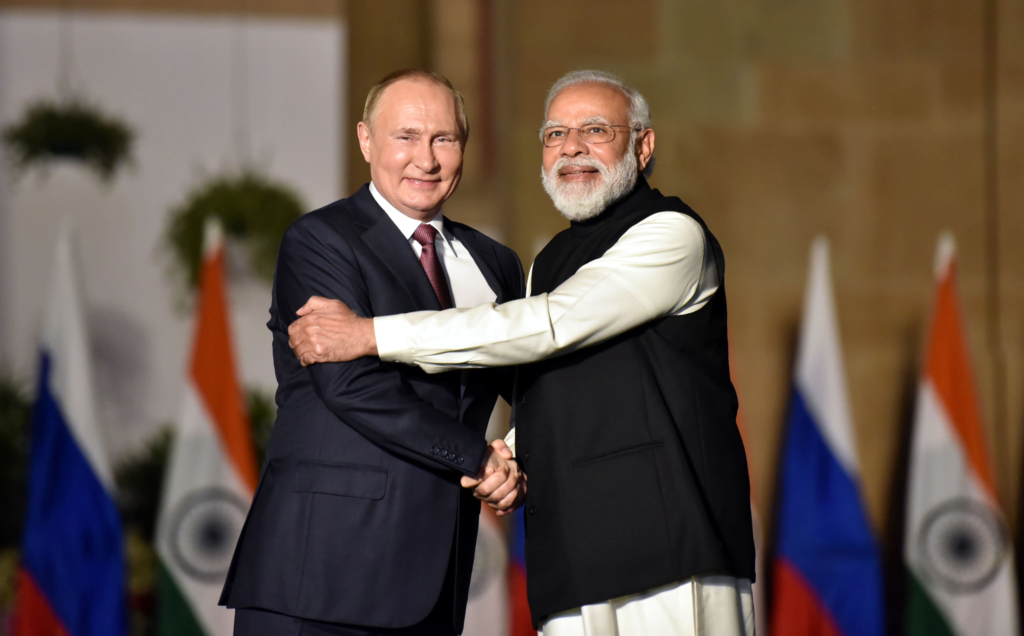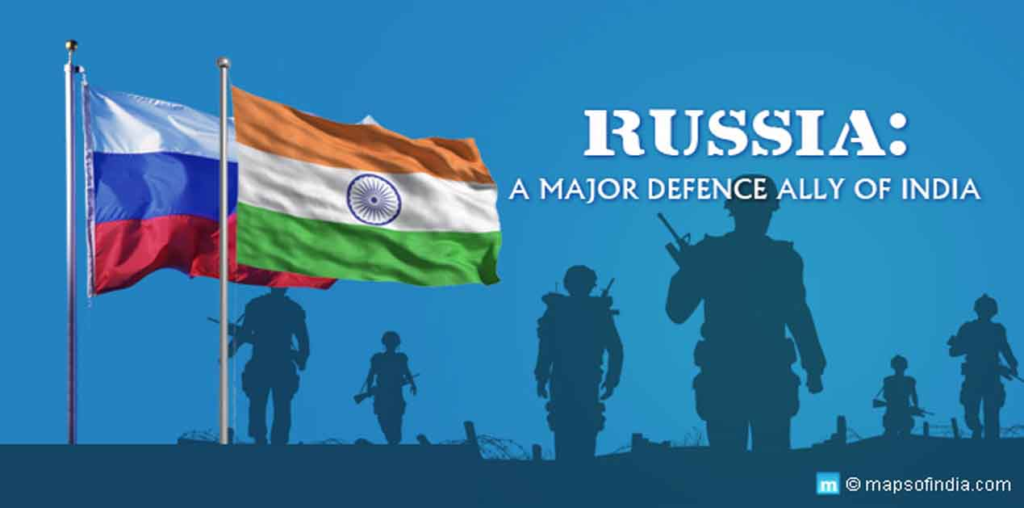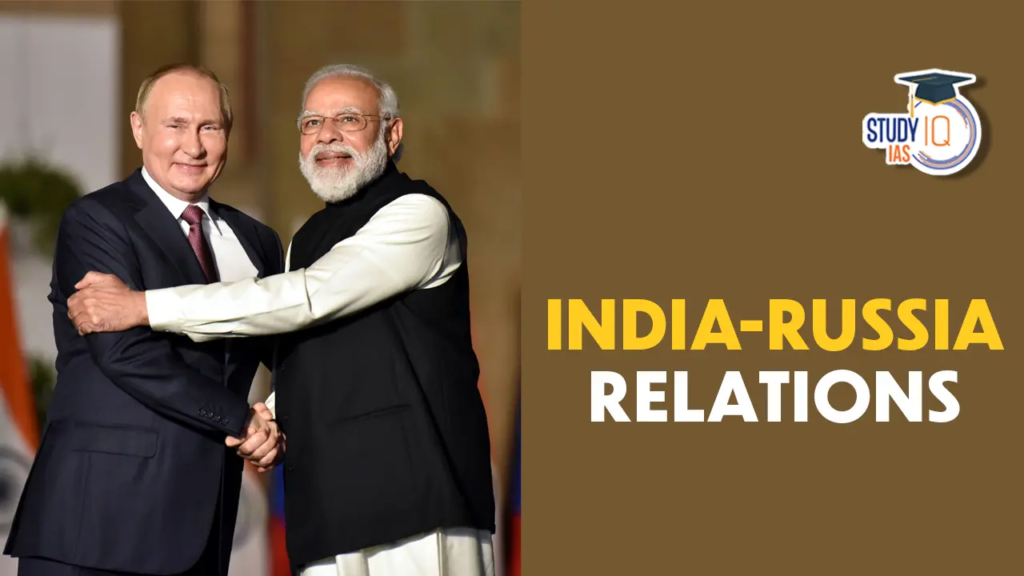India and Russia, two nations with deep historical ties, continue to nurture a robust and enduring partnership that has withstood the test of time. The relationship between these two countries, marked by mutual respect, strategic cooperation, and shared interests, plays a pivotal role in shaping the geopolitics of the 21st century.
As the global landscape evolves, the India-Russia friendship remains a cornerstone of both nations’ foreign policies, contributing to regional stability and global multipolarity.

Historical Bonds:
The foundation of the India-Russia relationship can be traced back to the days of the Soviet Union. The historical ties were cemented during the Cold War era when India, under the leadership of Prime Minister Jawaharlal Nehru, looked towards the Soviet Union for support and cooperation. The Indo-Soviet Treaty of Friendship and Cooperation, signed in 1971, was a testament to the strong diplomatic bonds between the two nations.
Post the dissolution of the Soviet Union in 1991, India and Russia successfully navigated the changing global dynamics, and their relationship transformed into a strategic partnership. The friendship that had its roots in shared values and a commitment to multipolarity evolved to address contemporary challenges.
Strategic Cooperation:

One of the cornerstones of the India-Russia relationship is their robust strategic cooperation. Both nations share common interests in areas such as defense, space exploration, and energy. The defense ties between India and Russia have been particularly significant, with Russia being a major supplier of defense equipment to the Indian Armed Forces.
Historically, Russia has been a key partner in India’s defense modernization efforts. The BrahMos supersonic cruise missile, jointly developed by India and Russia, is a shining example of the success of their collaborative defense ventures. The S-400 Triumf air defense system deal further underscores the strategic depth of the defense partnership.
Economic Collaboration:

While defense cooperation has been a bedrock of the relationship, India and Russia are actively seeking to diversify their economic engagement. Both nations recognize the untapped potential for growth in sectors such as trade, investment, and technology.
The International North-South Transport Corridor (INSTC), which aims to connect India to Russia and beyond via Iran, is a testament to their commitment to enhancing economic ties. Efforts are being made to streamline trade processes, reduce barriers, and explore new avenues for collaboration in areas such as pharmaceuticals, information technology, and agriculture.
Energy Partnership:
Energy security is a critical aspect of the India-Russia relationship. Russia has been a reliable supplier of energy resources to India, and the two nations have cooperated in the nuclear energy sector. The Kudankulam Nuclear Power Plant, a joint venture between India and Russia, stands as a symbol of their collaboration in the peaceful use of nuclear energy.
In addition to traditional energy sources, India and Russia are exploring renewable energy partnerships. As the world focuses on sustainable development, both nations recognize the importance of harnessing clean and renewable sources of energy.
Diplomatic Coordination:
Diplomatically, India and Russia have consistently supported each other on various global platforms. The United Nations, BRICS (Brazil, Russia, India, China, and South Africa), and the Shanghai Cooperation Organisation (SCO) are forums where both nations actively engage to address global challenges and promote mutual interests.

The two countries have consistently aligned their positions on key international issues, including counter-terrorism, climate change, and reforms in international organizations. The diplomatic coordination reflects a shared commitment to fostering a more inclusive and multipolar world order.
People-to-People Ties:
Cultural exchanges and people-to-people ties have played a crucial role in strengthening the bond between India and Russia. Educational collaborations, tourism, and cultural festivals have provided opportunities for citizens of both nations to understand and appreciate each other’s rich heritage.
Russian literature, classical music, and dance have found an audience in India, and vice versa. Educational exchanges have facilitated a deeper understanding of the diverse cultures, traditions, and languages that characterize both nations.
President Putin signs the decree to award the Prime Minister of India @narendramodi the highest civilian award of the Russian Federation -"Order of Saint Andrew the Apostle"@PMOIndia @MEAIndia @IndianDiplomacy @KremlinRussia_E @PTI_News @mfa_russiahttps://t.co/WSogiFGcNf pic.twitter.com/gGwXnptvdZ
— India in Russia (@IndEmbMoscow) April 12, 2019
Challenges and Future Prospects:
While the India-Russia relationship is characterized by resilience and depth, there are challenges that both nations must address. The evolving geopolitical dynamics, economic shifts, and the emergence of new global players require adaptability and innovation in the bilateral relationship.
Looking ahead, the prospects for the India-Russia relationship remain promising. As both nations continue to pursue their developmental goals and navigate the challenges of a rapidly changing world, the enduring friendship between India and Russia serves as a beacon of stability and cooperation. The partnership, built on the foundation of shared values and strategic interests, contributes significantly to regional and global peace, underscoring the timeless nature of their diplomatic ties.

